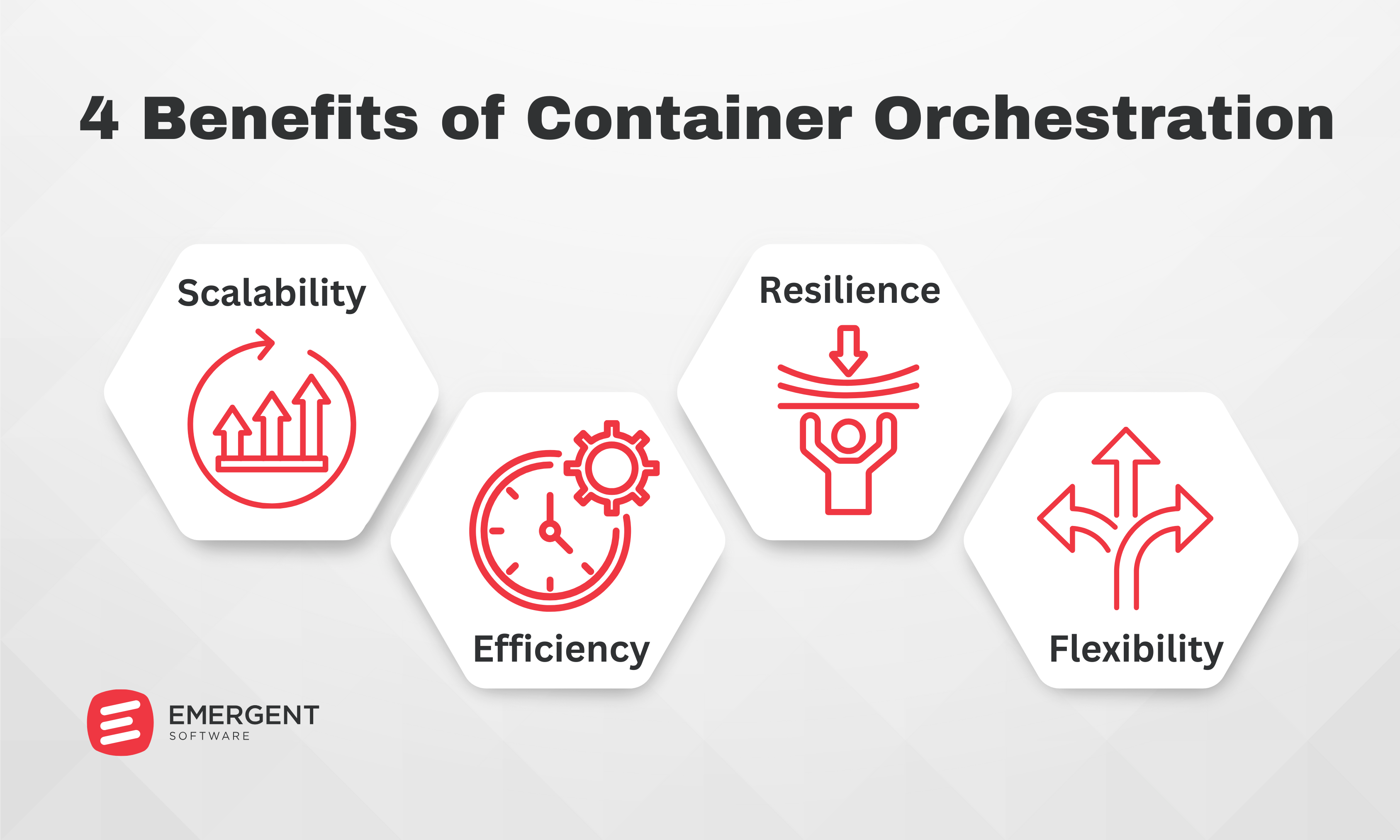The introduction of containerization has been a game-changer in software development over the past few years. By allowing developers to package applications and their dependencies into lightweight, portable containers, this technology has significantly streamlined the development, deployment, and management of software.
As companies continue adopting containerization to improve agility and scalability, the need to manage these containers efficiently becomes critical. This is where container orchestration comes into play.
Container orchestration is the practice of automating the deployment, management, scaling, and networking of containers. In large-scale environments, where hundreds or thousands of containers run simultaneously, manual management quickly gets inefficient and impractical. Container orchestration tools provide the necessary automation to manage these complex environments, ensuring that containerized applications run smoothly and efficiently.
The purpose of this article is to uncover what container orchestration is, why it’s important, and the key tools and benefits associated with it. It should provide a solid understanding of how container orchestration supports modern software development.
What Is Container Orchestration?
Container orchestration is the automated process of managing the lifecycle of containers, particularly in large, distributed environments. This includes deploying containers across a cluster of machines, scaling them up or down based on demand, managing their communication and networking, and monitoring their health.
Essentially, container orchestration handles all the heavy lifting associated with running containers in production, allowing developers to focus on building applications rather than managing infrastructure.
Managing containers at scale presents several challenges. Without orchestration, teams would need to manually deploy, manage, and scale individual containers, which is often time-consuming and prone to error. In addition, as the number of containers grows, so does the complexity of managing them.
Container orchestration addresses these challenges by providing a framework for automating the deployment, scaling, and management of containers across multiple hosts. This ensures consistency, reliability, and efficiency in containerized environments, regardless of their size or complexity.
Now that you’re familiar with container orchestration is, let’s dive into its key functions.
Key Functions of Container Orchestration
Container orchestrators serve many important functions, including deployment automation, load balancing, and health monitoring.
Automated Deployment and Scaling
One of the primary functions of container orchestration is automated deployment and scaling. Orchestration tools can automatically deploy containers based on predefined rules and scale them up or down depending on traffic or resource usage. This ensures that applications can handle varying loads without requiring manual intervention, and in turn, improves both performance and resource utilization.
Load Balancing and Traffic Management
Container orchestration also includes load balancing and traffic management, which are crucial for maintaining the availability, security and performance of applications. Container orchestration platforms distribute incoming traffic evenly across multiple containers, ensuring that no single container becomes a bottleneck. This is especially important in microservices architectures, where different services need to communicate efficiently.
Health Monitoring and Self-Healing
Another critical function of container orchestration is health monitoring and self-healing. Orchestration tools continuously monitor the health of running containers and automatically replace those that fail or become unhealthy. Self-healing ensures that applications remain resilient and available, even in the face of failures.
Automated Updates and Rollbacks
Updating containerized applications is often a complex process that can introduce downtime or errors if not handled properly. Container orchestration platforms provide automated updates and rollbacks, enabling developers and administrators to deploy new versions of their applications with confidence. If an update causes issues, the tool can automatically roll back to the previous version to minimize the impact on users.
4 Benefits of Container Orchestration
Scalability
One of the most significant benefits of container orchestration is scalability. Orchestration tools allow companies to scale their applications seamlessly, adding or removing containers based on demand. Better scalability means applications can handle high traffic volumes without downtime or performance degradation, allowing businesses to grow and adapt to changing needs.
Resilience
Resilience is another key benefit of container orchestration. Through self-healing and automated failovers, orchestration tools ensure that applications remain up and running even when individual containers fail. This minimizes downtime and enhances the overall reliability of the application, which is critical for maintaining user satisfaction.
Efficiency
Container orchestration optimizes resource utilization by dynamically scheduling containers based on available resources. This means that containers are efficiently distributed across the cluster, avoiding resource contention and ensuring that no resources go to waste. As a result, companies can reduce their infrastructure costs while maintaining high performance.
Flexibility
Finally, container orchestration offers unparalleled flexibility, particularly in supporting hybrid and multi-cloud environments. Orchestration tools like Kubernetes allow companies to deploy and manage containers across different cloud providers or on-premises data centers. This flexibility is crucial for businesses that need to adapt quickly to changing requirements or leverage the unique features of different cloud platforms.

Conclusion
Container orchestration is a vital component of modern software development, particularly in environments where containerization is used at scale. By automating the deployment, scaling, management, and monitoring of containers, companies can build and maintain scalable, resilient, and efficient applications.
As containerization continues to grow in importance, so will the role of container orchestration. Companies that invest in these tools will be better equipped to manage the complexities of modern software development and thrive in an increasingly competitive landscape. It doesn’t matter if they are managing a small set of containers or overseeing a distributed environment - understanding and leveraging container orchestration is a core IT practice that all companies should master.
Improve Container Management with Azure Kubernetes Service
Azure Kubernetes Service (AKS) helps you configure, deploy, and manage containerized applications efficiently on Microsoft’s cloud platform. Our team here at Emergent Software can make your transition to AKS as smooth as possible. Reach out for a free consultation today.
FAQ
Here are some commonly asked questions about container orchestration. Reading them should help clarify some things further.
What is container orchestration in simple terms?
Container orchestration is like an automated system that manages and coordinates many small software pieces to ensure they run smoothly together, especially when things get complicated.
Is Kubernetes a container orchestration tool?
Yes, Kubernetes is currently the most popular container orchestration tool.
What is the best container orchestration tool?
The best container orchestration tool is often considered to be Kubernetes due to its widespread adoption, scalability, and robust ecosystem.
What is the difference between Docker and Kubernetes?
Docker is a platform for creating and running containers, while Kubernetes is a tool for orchestrating and managing those containers at scale.
Is Docker Swarm different from Docker?
Yes, Docker Swarm is different from Docker. Docker is used for creating containers, while Docker Swarm is a native orchestration tool within Docker for managing and scaling containers.
What does orchestration mean in storage?
Orchestration in storage refers to the automated management of storage resources, including provisioning, scaling, and managing data across various storage systems to ensure efficiency and reliability.






